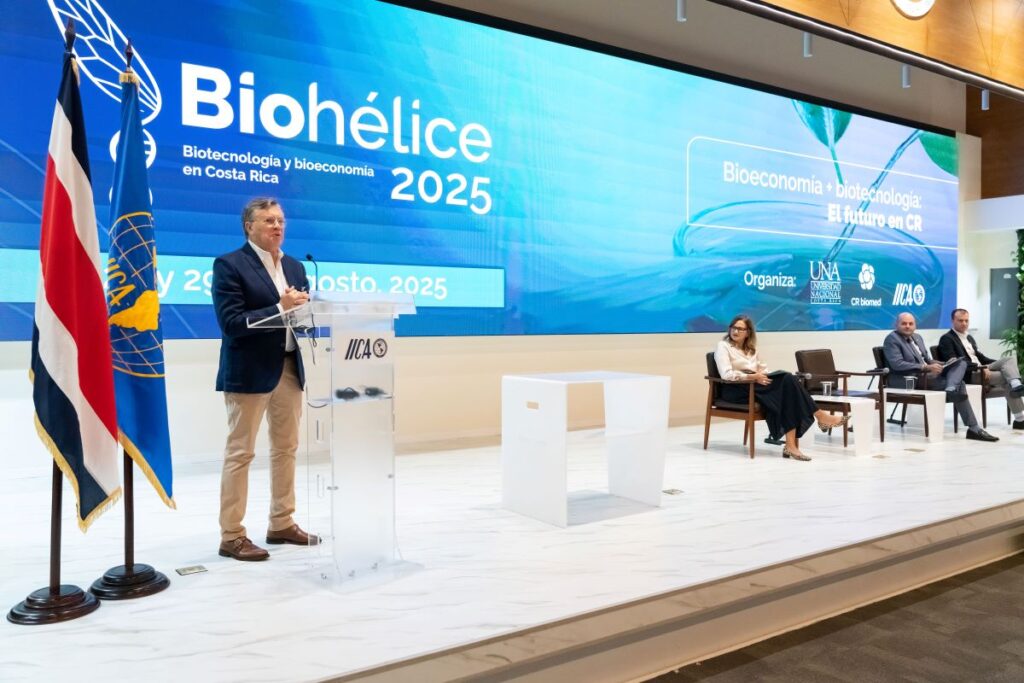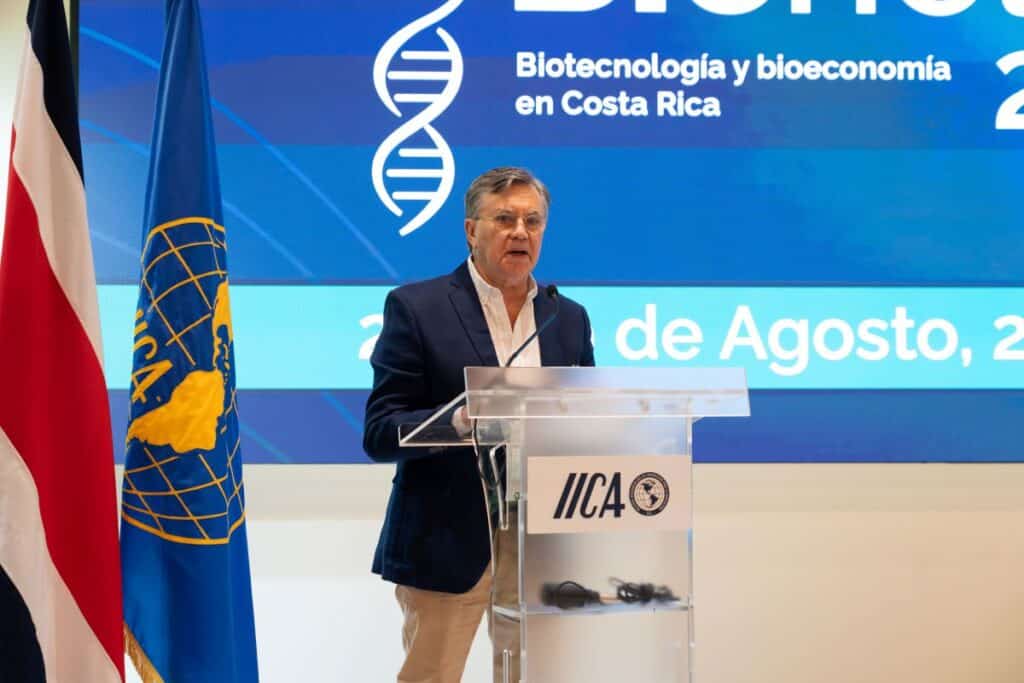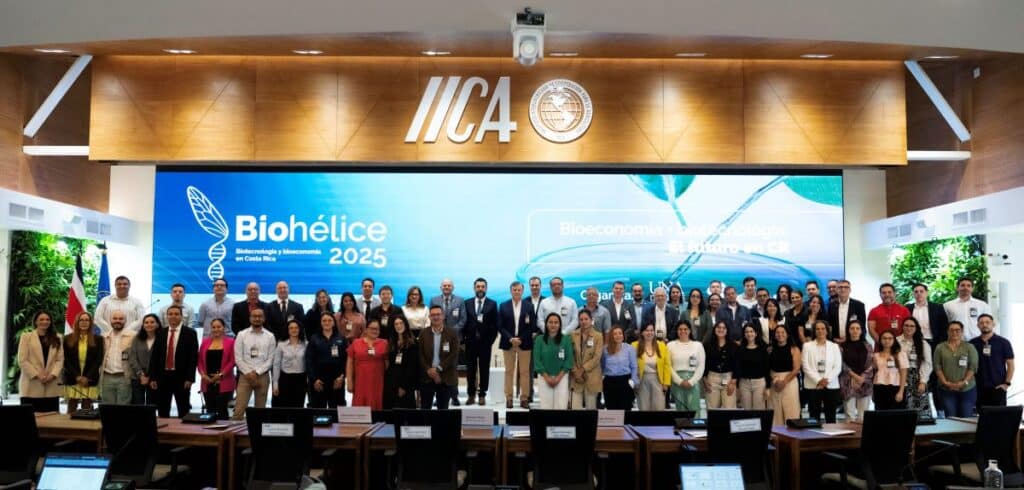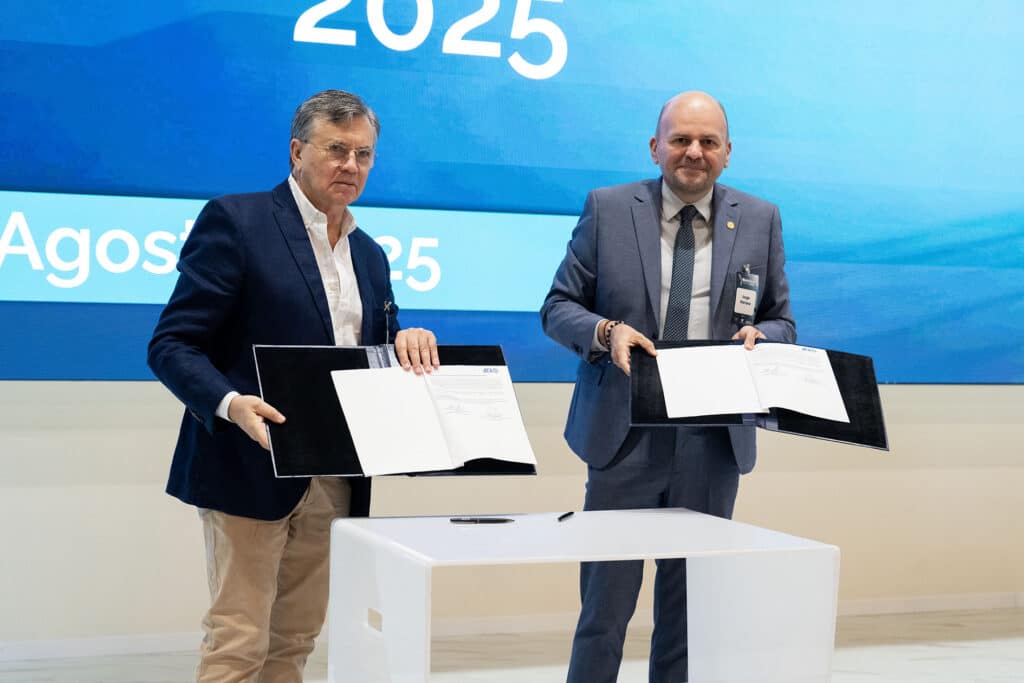
San Jose, 3 September 2025 (IICA). The bioeconomy is an engine of sustainable development that integrates innovation, scientific knowledge and the responsible use of biological resources. For Costa Rica, and the rest of Latin America and the Caribbean (LAC), the sector represents a strategic pathway to employment creation, the revitalization of rural economies, and greater social inclusion, positioning them as regional leaders in sustainability and production transformation.
This was the commonly held view of experts attending “Biohélice 2025: Biotecnología y Bioeconomía en Costa Rica”, organized by the National University of Costa Rica (UNA), the Costa Rican Cluster for Biotechnology, Life Sciences and Medical Devices (CRBiomed) and the Inter-American Institute for Cooperation on Agriculture (IICA).
The two-day meeting, held at IICA Headquarters in San Jose, brought together more than 130 participants from the public sector and academia, scientists, bioentrepreneurs and investors committed to the sustainable development of Costa Rica, with a view to strengthening the linkages between science, technology and sustainable development.
The President of UNA, Jorge Herrera; the Director General of IICA, Manuel Otero; the President of CRBiomed, Álvaro Peralta; and the Director General of the Costa Rican Investment Promotion Agency (CINDE), Marianela Urgellés, presided over the opening ceremony of the event.
Herrera argued that, “Today, innovation and the bioeconomy are pointing the way to the sustainable development of countries. For Costa Rica, the bioeconomy offers a historic opportunity for socioeconomic development”.
“Our country is already world renowned for its natural wealth and its traditional respect for the environment, and it has the conditions to become a global thought leader in this area”, he added.

Otero, on the other hand, reaffirmed IICA’s commitment to promoting the bioeconomy as a strategy to transform agriculture and revitalize rural areas, while noting that this model facilitates the creation of employment, environmental value and new production chains, making the countryside a source of innovation and opportunities.
“The bioeconomy provides a bridge between production and the environment. We must no longer view it as a threat but rather as a source of enormous opportunities. We support it and hope that IICA will become the leading expert on the bioeconomy in Latin America, promoting public-private partnerships and technical capacity development throughout the entire region”, said the Director General of the Institute.
Álvaro Peralta reflected on the importance of connecting science and the market by increasing linkages between academia, industry and public policy. He also agreed that Costa Rica has the capacity to become a bioeconomy powerhouse, thanks to its talent and how it has differentiated itself.
The CRBiomed President noted that, “The country has the opportunity to become a heavyweight in bioeconomy research, development and innovation. This is not a dream but is completely realistic. Laboratory science can be taken to the market, becoming intellectual property for businesses and creating a powerful innovation ecosystem”.
CINDE’s Marianela Urgellés emphasized the transcendental importance of intersectoral collaboration to drive bio-innovation as the engine of sustainable and competitive development. She also applauded the hosting of events such as Biohélice, which become platforms that bring together key stakeholders in the ecosystem.
“Biohélice and its synergies are driving the ecosystem forward with dynamism and based on a shared vision. Costa Rica has the capacity, talent and vision to lead the way towards a sustainable and inclusive bioeconomy”, she insisted.

Diverse and high-level agenda
Biohélice 2025 was divided into two one-day sessions: Symbiosis and Bioleaders.
The core theme for Day One was the convergence of the bioeconomy and scientific leadership. It sought to promote the integration of science, technology and society, driving the scaling up of innovative solutions by academia. It also aimed to strengthen collaboration between universities, research centers and strategic actors to position knowledge as an engine of the national bioeconomy.
Day Two focused on multisectoral coordination and public-private collaboration to scale up high-impact biotechnology solutions. It sought to foster dialogue between science, industry and investment, defining concrete pathways to translate innovation into sustainable economic development.
The meeting featured a wide variety of activities, such as conferences, talks, workshops and panel discussions, addressing key topics related to bioeconomy development. The discussions touched on international innovation ecosystem experiences, scientific advances in biocatalysis and biopolymers, as well as success stories around the world in different sectors, for example in aviation biofuels and cosmetics.
The presentations also addressed commercialization strategies for startups and intellectual property tools. The panel discussions brought together experts to analyze public policies, investment opportunities and pathways to sustainable production transformation in Costa Rica.
During the meeting, UNA and IICA signed a technical cooperation partnership agreement for the next five years, aimed at contributing to the development and advancement of the bioeconomy in LAC through academic, scientific, teaching, and research activities, as well as extension services and the movement of people throughout the region.

More information:
Celestina Brenes, Technical Specialist of the Innovation and Bioeconomy Hemispheric Program, IICA.
celestina.brenes@iica.int











